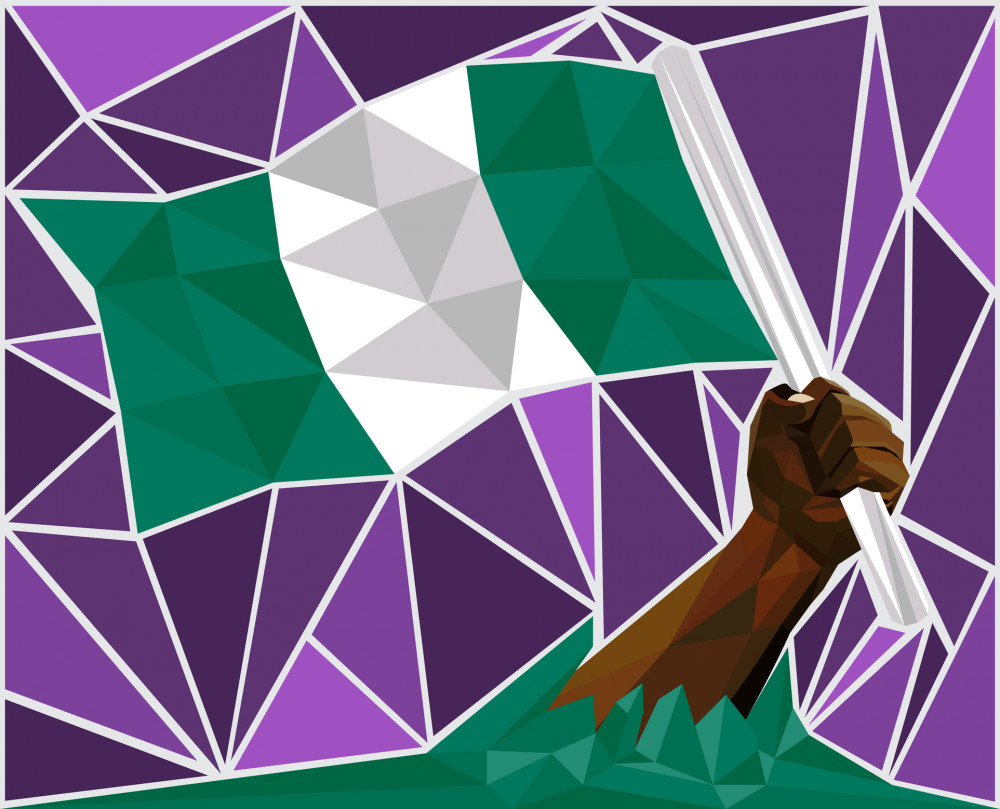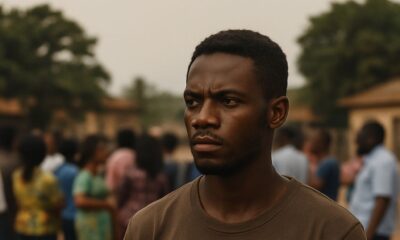Features
Oluwadunsin Deinde-Sanya: Who Gets to Tell the Other Side of Our Story?
While it is good to tell good stories and stop painting our country and continent in bad light, I owe it to Sadika, a little girl my sister met in Kebbi who is smart but has never gone to school and is forced into child-labour, to tell her story. I have to tell the story of that little crippled girl I met in Obalende who has no house and lives on the street.
***
There’s poverty, insecurity, terrorism, daft leaders, poor healthcare system, illiteracy… just name it, we have them all.
 A few years ago, I wrote a story where I highlighted a lot of negative things I experienced or heard in Nigeria. My friend, a Northerner, called me and asked: “you schooled in the North, did you enjoy your stay there?” Of course I did, my experiences in Jos, Kaduna and Kano is one I wouldn’t forget in a long time.
A few years ago, I wrote a story where I highlighted a lot of negative things I experienced or heard in Nigeria. My friend, a Northerner, called me and asked: “you schooled in the North, did you enjoy your stay there?” Of course I did, my experiences in Jos, Kaduna and Kano is one I wouldn’t forget in a long time.
Jos was cool. From the weather to the people and the food, I had so much fun. In my first few months of resuming school, I experienced iced cubes falling as it rained. My friends and I would rush out of our rooms to pick the cubes to lick. I cannot forget the many massa and soup I ate, the fura de nunu that always made my afternoon, the gwote my friend from Bauchi always made and the way my classmates and I always laughed at our Yoruba lecturer who used to blow hefty gbagauns in class. We climbed hills and I swore that day that I’ll never try it again. I lied. The week after, my friends and I went hill-climbing again.
In Jos, I experienced so much peace – it was different from where I was coming from. There was no gragra or gregre. There was no noise, no pressure, no rushing or having to hustle to get a bus. There was peace – cool, calm and soothing.
In Kaduna, my friend’s mother made me kunu-aya and massa. I remember I ate too much of these that I purged and puked until she gave me drugs to take. Even at that, I still got a large nylon bag and stuffed massa into it when I was going back to Jos.
It was in Kano I first experienced what 24 hours power supply meant. Coming from Lagos where our light had K-leg, I marveled at how much power supply we had it Kano. But Kano was just like Lagos to me and I hated following my aunty to the market after Sunday service.
My friend continued: “if you enjoyed the North so much, why is it that everything you wrote in your article was negative?”
According to him, the North already had a ‘bad reputation’, many Nigerians believe that Northern Nigeria is a region filled with bad stories, starved children carrying coloured bowls, violence and terrorism, Islamic-extremists and… any other bad thing you can add. Even the word ‘aboki’ which is supposed to mean ‘friend’, is being used in a derogatory manner by Westerners and Southerners.
My friend believed that as someone who had stayed in the North for a while and enjoyed my stay, I was supposed to use the opportunity to write positive things about the North, change certain narratives and try to eradicate the stigmatisation that plagues Northern Nigeria.
He was right… and wrong.
Although I enjoyed my stay in Northern Nigeria, there are several moments that I can never forget. Like when the walls in my house cracked after a bomb went off in a church that was just two streets away. The memory of children packing their mother’s mangled body into a wheelbarrow. The walls of the church falling on a pregnant woman who died instantly, her stomach tore open and her dead baby gushed out alongside her intestines and other internal organs. I won’t forget those children who were looking for their mother and eventually saw only her head.
When the news was told on TV, they said “only 3 people died and many injured”. It was a lie.
When a boy was burnt right in front of my home, I knew that his shadows would haunt me for long. I watched him beg for help but I was helpless. He had been beaten to a pulp by angry and fed-up men and women. When he was burnt, the fire died before his life left him and a guy picked up a large rock and smashed his head with it. His skull burst open and his blood and brain popped out. That night, his dead body lay opposite my door and I stayed inside, shivering. For many nights, I couldn’t sleep, I saw his blood on my walls and his body on my bed. I left the house and went to stay with my friend.
His story never made the news.
I won’t talk about the bodies I saw hung on a stake in Faringada. The smell of burnt bodies that lingered for hours or the day my sister was almost caught up in the Terminus market bomb blast.
I understand my friend’s point, his need to see good stories told of the North and his disappointment that someone like me didn’t do that. This is also how I feel when I read stories written by white people about Africa or even those written by Africans for an international magazine. White people, and western media in general, feel the need to highlight only the bad aspects of Africa. They are always eager to paint themselves as the messiah coming to save a continent filled with people who have flies trailing them, starved children, love violence and are so dumb that they can’t think for themselves or solve their own problems.
Stories like these irk me. But it is almost the same way an average westerners or southerner writes about Northern Nigeria.
But is it a lie?
A few days ago, I had a discussion with a friend of mine who is a photographer. We talked about telling African stories; and just like me, he hates it when his friends – who are photographers – take photos of the slums of Nigeria or people ravaged by poverty or crisis.
But isn’t this our reality? In a bid to not become the western media who love to talk down on Africa and highlight only the negative aspects of the continent, we also have to he careful not to pretend that all is well with Nigeria and Africa.
Northern Nigeria is too underdeveloped for a region where most of our leaders have come from; and it is painful. Their elites have done nothing but enrich themselves while plunging their people into poverty and encouraging them not to embrace education. Their political leaders have ensured their people are impoverished, remained as illiterates and kept as voting tools. Their religious leaders have failed.
It is the same in Bayelsa. I saw poverty there. I saw oil come out of my tap water. I saw fishermen weep and farmers cry. And I saw their kings in the finest of robes.
The same in Lagos. For every time I step out of my home, there is always one person who approaches me to beg for money. Fraud or not, people are starving and hungry. People live under Ijora bridge, people live in Makoko, the former residents of Tarkwa Bay are homeless now, people live under CMS bridge.
There’s poverty, insecurity, terrorism, daft leaders, poor healthcare system, illiteracy… just name it, we have them all.
While it is good to tell good stories and stop painting our country and continent in bad light, I owe it to Sadika, a little girl my sister met in Kebbi who is smart but has never gone to school and is forced into child-labour, to tell her story. I have to tell the story of that little crippled girl I met in Obalende who has no house and lives on the street.
I have to tell the story of the little boy who was burnt in front of my house. I have to tell the story of that woman in Lagos who was lynched because she was accused of stealing pepper and tomato – which was eventually found after she had died. What of the Aluu 4? What of the over 90 million Nigerians in extreme poverty? The child-bride in Nigeria? The Almajiri children in the North? The millions of refugees and displayed persons? What of the women in the IDP camps that are forced to have sex with the officials before they are given food to eat? What of the young Nigerians killed by SARS? I want to talk about how crisis in the North has affected my family. I want to talk about the baby-making factory in the East.
There are too many sad stories and they shouldn’t be overlooked just because we don’t want people to see our country in a bad way. At the same time, we, Africans, should not be swift to tell negative stories about ourselves just because we want to be at par with the western world or be featured on their website or magazine. Patriotism is also key.
How then do we balance these stories? How do we avoid worsening the image of our country and Africa but at the same time telling the stories that need to be told?
While the western media and white people tell these stories to feel better about themselves and make themselves feel like the saviour of Africa, we, Africans, must tell these stories to drive change and demand for a better country and continent.
It is a dilemma that we have found ourselves in, but we have to figure it out.
Anyway, I have no solution yet. I just want to rant.



















